Gilad Atzmon's Blog, page 9
March 2, 2015
The Meaning of Bibi
By Gilad Atzmon
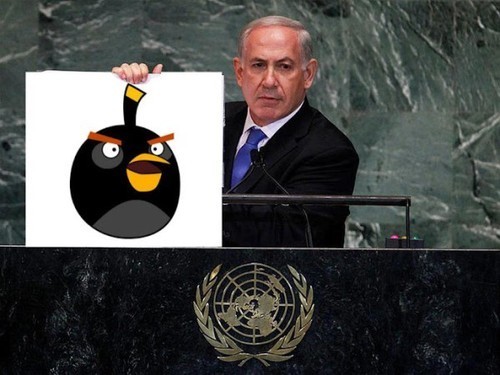
The entire spectrum of Jewish politicians from Left to Right expends vast amounts of energy attempting to conceal problematic Jewish cultural and ideological symptoms. Benjamin Netanyahu is different; he is the total manifestation of all such symptoms. He brings to light everything despicable in Israel and in Jewish politics. He is the epitome of everything we reject in Jewish ID politics, Zionism as well as ‘anti’. Bibi publicly imposes himself on America, its people, the American Congress and the Obama administration. Bibi blatantly interferes in American strategic and national security interests. And he gets away with it.
If anti-Semitism is defined as the Goyim’s reaction to Jewish misbehavior, Benjamin Netanyahu provides us with an incredible opportunity to observe such transgressions in action. Though Bibi’s misconduct is obvious to most Jewish commentators, the entire Jewish world has failed to prevent him from proceeding with his disastrous Congressional address. This is a devastating omen for the Jews. Jews as an ethnic and ideological collective lack the means to restrain itself and its destructive powers from within. This may help to explain why the Jewish past can be construed as a chain of Shoahs. This failure to police its own also suggests that the answer to the Jewish question is anything but collective. If Jews want to save themselves from the fate imposed on them by other dangerous prominent Jews, they better find an individual route out of choseness.
March 1, 2015
Made In Israel-Isis Parody
Those who are familiar with the Yinon Plan have some good reason to regard Isis and the chaos in the middle east as an Israel product. This Isis comedy is also an Israeli product...
The Discordant Who? Atzmon and Debate
Brief introduction by GA: this is a uniquely strong text penned by Dennis Harrison, the owner of the best and one of the last book shops in Britain. I admire Dennis for writing this commentary. I have known Dennis for a few years but I didn't realise how familiar he was with issues to do with Zionism, Jewish ID and so on. When you visit Oxford pay the Albion Beatnik Bookstore a visit. Truth is waiting for you there on the book shelves.
By Dennis Harrison
https://albionbeatnikbookstore.wordpress.com
I read the other day that Gilad Atzmon’s book The Wandering Who? has been taken off the virtual shelves of the Guardian book web site.

My first reaction was to be amused that the Guradian ever had a book web site, for it’s a bit like Halfords selling doughnuts or a local corner shop trying to sell insurance: it’s just naff. My second reaction was to congratulate the author. To be castigated by the Guradian, possibly one of the worst newspapers in the western world, is an accolade and is bound to sell books and highlight his pitch. Just because the Guiaradn espouses liberalism, social welfare, justice, world peace, feng shui and climate change doesn’t prevent it from being a bottleneck for all these issues, and to my eyes the paper tilts at windmills and sidetracks the main issues of any story, as ‘good’ liberals tend to do. In other words it has long hair but it isn’t really much of a hippy. Of course it now adds to its CV that it has silenced a voice of dissent, the sort of act one has come to associate with dictatorship and oppression.
Atzmon is a proud self-hating Jew, a man with foreskin envy who has tried sincerely to come to terms with his road to Damascus discovery: when a young man serving in the Israeli militia in Lebanon he witnessed Palestinian prisoners of war kept in cages like dogs, and he wondered why his nation, born out of concentration camp suffering, could inflict such pain; his external world crumbled when he interpreted Israel to be a tragic Palestinian palimpsest. His prodigious talent as a jazz saxophonist afforded him a passport and he settled in England twenty years ago, never to return to Israel.
His book is self-conscious and single-minded in its quarry: it is about Jewish identity politics (as its subtitle declares) and a central theme is to compare it to other forms of marginal identity politics. It does not even broach biological determinism. In fact Atzmon has no beef with, and even has respect for, those who are of the Jewish faith or those who see themselves as of Jewish origin. There may be many problems with the book. One may say that it oversimplifies, it may seek to transport its reader on a magic carpet of conspiracy theory and intrigue and offer no hinterland of proof, it may have only a cartoon grasp of world economics, banking, politics or realpolitik, it may in fact be wrong. But only rarely does a critic engage the book upon its premise, that Jewish identity for some straddles the Zionist/anti-Zionist divide and has Chaim Weizmann’s dictum that “there are no English, French, German or American Jews, but only Jews living in England, France, Germany or America” as its shibboleth. It seems a relevant issue to address as we have been told recently that, disturbingly, 58% of Jews consider that they have no future in Britain (and that 95% of hate crimes in the UK are anti-Semitic in nature!). I just don’t believe these figures, maybe I am naïve, but if they are to be believed then Atzmon’s book might become an uncomfortable read. Neither is the book without relevance in international affairs as the bombs fell as confetti upon Gaza last year.
Oddly the Guranida is licking its dog’s bollocks rather late in the day, for The Wandering Who? was published over three years ago and to much furore then: a shambolic revolt by some of Atzmon’s Zero Books stablemate authors, a melee of carping reviews and general butt kicking with legal threats unleashed upon the publisher (to their credit they stuck to their guns and published, the obvious anti-precedent being St Martins Press in the United States who got cold feet after announcing publication of David Irving). Alan Dershowitz had a public spat but drew attention only to Atzmon’s possibly diametric philandering – that he loves Palestine before Israel, loves original thought before plagiarism, and allegedly loves his saxophone before Jeffrey Epstein.
So all in all I find it rather extraordinary that the book has been removed from the Gi*uckrd office, custodian of liberal thought, and incidentally not so long after Atzmon was prevented from performing in Bonington by Gedling Borough Council, a sort of kangaroo council decision following childish allegations by some locals, who included Ross Bradshaw, founder of Five Leaves Publishing and, incredibly, one of the most brilliant booksellers there is. (The dog it was that died, and to ruffle Bradshaw’s jackboot Daniel-in-the-lion’s-den complex with my own crude, knee-jerk reaction, I shall ignore his venomous political correctness that prevented a purely musical performance taking place and that almost left over 100 people bereft of their evening’s entertainment, and I shall continue to stock Bradshaw’s books, an act of irresponsible defiance of his public spitefulness; indeed I once sold one of his books, and he can try and guess to whom.)
Gilad Atzmon is a perplexing figure. He is an international jazz saxophonist, many would argue one of the very finest in the world today, a stature confirmed by his appearance on the latest Pink Floyd album. Yet at the same time he has led a parallel life as author, public speaker and television pundit of renown in a very dangerous discourse. To run two high profile careers has been courageous, and that he has dodged the endless flak that has come his way, including death threat, is a miracle. It may be that his jazz artistry has anointed him with some sort of protection; some argue also that it has allowed him to exploit his position and soft sell what is seen to be his anti-Semitism, though I believe he is straightforward both in what he says and how he says it. The intriguing question is where does his personality end and his argument begin? – a question one can ask of all muckrakers, seekers of the truth, iconoclasts; he certainly takes no prisoners. He may have idiosyncratic thought or strike an argumentative discord, yet he has never dissembled, backtracked or yielded for the sake of a more comfortable life; indeed he has seemed to rejoice in the fevered spotlight and has seen criticism often to be a validation of his argument. Although I understand that what he says is problematic, I am content not to view him as anti-Semitic and equally am content not to agree with all that he says.
The reaction to Atzmon’s heretical diatribe is to me very confusing. It reminds me how I was confused too by the whole “Je Suis Charlie” episode and remain so, was left with a feeling of unease – as it wasn’t to my mind really about freedom of speech, rather about how we in the west deal with the Muslim world. I felt that it was a bit like being hit on the head by a Marks & Spencer boil-in-a-bag souffle at a Friday evening dinner party in suburbia: freedom of speech should be more than supporting middle class, white, arty people take the piss out of somebody else’s prophet, a stark contrast to the freedom of speech allowed to the Parisian stand-up comic Dieudonné. When freedom of speech cascades down to sanctioning who can say what when and where, it’s a bit of a thing for dilettantes. It’s back to basics: I can surmise only that the Guardian and Bradshaw are dilettantes in this respect.
Atzmon dealing with protest
Atzmon in conversation with Paul Eisen part 1 / part 2
Gilad Atzmon and the Orient House Ensemble in performance
A beautiful album review By Peter Bacon @ The Jazzbreakfast
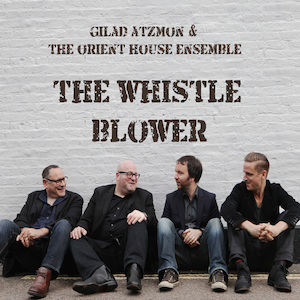
By Peter Bacon
(Fanfare Jazz FJ1501)
Eight albums in nearly 15 years together – with minimal personnel changes along the way – is quite an achievement and a tribute to the resolute determination, energy and creativity of the bandleader and his dedicated fellow musicians.
Atzmon is the epitome of WISIWIGness: as forthright in his music as in his opinions, as witty and playful, as deadly serious, as exuberant and intense, as romantic and sentimental, as visceral and pugilistic, and as generally bursting with personality. This is a man who appears to live life at a higher, wilder, riskier level than most of us have the energy for.
That album title might have all kinds of Edward Snowden connotations but even as he means it to signify straight-talking, exposing hypocrisy and generally being a thorn in the side of the establishment, so too is it full of (mock) modesty. Everything has a double meaning with Gilad, the playful manipulator not only of notes but of words as well. He says in the liner notes: “I am an avid admirer of simplicity and transparency, the moment of clarity that leaves the mind in the dark, yet content. I guess that is why I blow the whistle instead of playing the fiddle.”
And, my, can he blow a whistle – or in this case, alto and soprano saxophones and clarinet (he also contributes accordion, guitar and vocals). Long-time Orient House residents Frank Harrison on piano and Yaron Stavi on double bass are joined by new boy Chris Higginbottom on drums.
Gaza Mon Amour welcomes the listener into a wild Middle Eastern dance, complete with chanting, which then in the course of Atzmon’s alto solo morphs into A Love Supreme quotes and more jazzy territory; Forever and The Romantic Church find the band exploring their romantic, spiritual sides, with some gorgeous piano from Harrison on the latter; Let Us Pray goes back to Coltrane-ish searching jazz; The Song is just that, a rich accordion-led melody; To Be Free sets the band on an intense, free-rhythmed, soprano-led exploration; while For Moana (Atzmon seems to hold a flame for Italian porn actress-turned-politician Moana Pozzi, whom he calls “my vintage romantic heroine”) finds us back among the seductive candlelight, though with more than a little greasepaint and glitter in the air.
I’m not sure The Whistleblower is this band’s strongest ever album, but it’s pretty close.
To Buy The Whistle Blower online:
Atzmon and Orient House have always been hard-working giggers, and they are half-way through a four-month tour of England. The Midland dates still to come are Birmingham Jazz at The Red Lion on Friday 6 March and Leicester Jazz House at the Y Club on 1 April. For a full list of dates go to Gilad’s website here.February 28, 2015
Gilad Atzmon & The Orient House Ensemble @ The Crypt
By Erminia Yardley

Photo: Courtesy of Carl Hyde
The Crypt, an uncompromising, “properly” dark venue hosts Gilad Atzmon and his Orient House Ensemble on a cold and drizzly Friday night in South-East London.
This is a venue for hardcore fans and diners, there is just about enough to see where one is going, especially if one is heading towards the bar or the toilets. But… this is the beauty and fascination of the place: beautifully sinister with walls as thick as a proper crypt should have. The clientèle that has gathered for the night’s performance is other-worldly.
Someone is sulking as she is desperate to find additional stools for her friends to sit on, alas, in vain.
There is something about this crowd, it is of mixed ages, backgrounds, languages. In fact, I believe it has created the perfect atmosphere for a jazz gig. We are, after all, miles away from the Ronnie Scott’s of this world… and yet, this place, like another one of my favourite jazz venue (in Greenwich), Oliver’s Jazz Bar, is part of that journey we all have to experience. Jazz’s fluidity is born out of a venue, too. The Crypt manages that pretty well.
And then, the band take the stage, around 9.30pm, the audience hush and Gilad, followed by Yaron Stavi on double bass, Frank Harrison on piano and Chris Higginbottom on drums open the show with “Gaza Mon Amour” which is from the new album released this month.
Gilad’s sax playing is so prominent, there is no time to think, one is taken in, almost dragged in by the captivating notes of “Gaza”. It is a beautifully melodic but also rhythmic composition. When I first heard it, I was so struck by it, I had to listen to it several times in a row.
The sound of the band playing is made even better by the acoustic provided by the venue.
Yaron’s bass playing is so chilled, I am thinking there might be ice forming around the stage, but the guys pick up together again and there is such a mellifluous sound which is so full of passion, the ice melts, the audience is attentive and starts listening. This is a clear example of how music IS a global language everyone can understand.
Gilad, a driving force, gets the crowd keeping the tempo, nodding and tapping their feet.
A very good start.
Yaron has switched to hugging his bass and plays with such intensity: this is jazz from a different dimension. Then the upbeat sound of Gilad’s sax breaks the spell, the audience had been kept suspended by the most amazing few minutes of music improvisation.
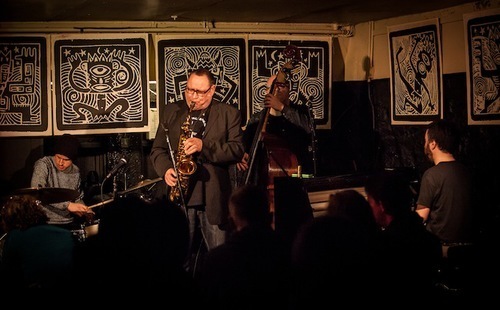
Photo: Courtesy of Carl Hyde
The tempo keeps on growing and it is interesting to see all the heads nodding along to the beat, refreshing to witness such understanding towards a type of music that goes beyond the mere straightforward, there are no straight patterns here tonight.
“The Whistle Blower” – the title track ends the 1st set. There is a reference to what the whistle blower is intended in this case: someone that whistles after someone to express pleasure, a very much Italianesque pursuit.
It’s time for the 2nd set to start. The crowd is eager to have more. There is a guy sitting by one of the walls with his eyes closed, nodding his head gently to the tune that has just started again. Frank Harrison’s piano playing is swift, crisp, smooth.
There is a lovely little introduction before the band play “For Moana” (Moana Pozzi was an Italian porn star who died at the age 33). Having chatted briefly to Gilad during the interval and mentioned my Italian origin, Gilad turns towards me asking me to go on stage and talk about Moana… in Italian, but quite rightly says that perhaps only the two of us would understand it, so a few laughters later, we agree they should just start playing. The track is beautiful and tender reinforcing the romantic side of Gilad.
From inside the album’s cover, part of a quote I cannot help but thinking of:
“I am old fashioned,
An honorary knight
Of the romantic church
I am the imam of retro
And I am happy”
Gilad Atzmon, multi-talented instrumentalist, writer, political animal, romantic, together with the Orient House Ensemble, has created a magical night. It’s cold outside, it is going to be difficult leaving the Crypt with all its quirkiness and fantastic passionate music.

February 27, 2015
Jazzwise Special: The Third Man - A Very interesting interview by Stuart Nicholson

For the past two decades Israeli born, British based saxophonist, author and political provocateur Gilad Atzmon has matched his incendiary and controversial opinions with a relentlessly questioning attitude to the establishment and his own identity. With 15 albums to his name- backed by his rip-roaring Orient House Ensemble - Atzmon's latest, The Whistle Blower , is perhaps his most compelling to date. His Garrulous playing both mesmerizing and melancholic by turns. Stewart Nicholson discovers the outspoken polymath is still searching for answers in today's polemical maelstrom through passion, humour and politics.
By Stuart Nicholson
Being persistently iconoclastic is not easy work. Fueled by passion, it’s a commodity that can dim with the passage of time. But not the passion that burns within Gilad Atzmon, as his latest album The Whistle Blower reveals. It’s his most personal statement to date, his fifteenth since making Spiel in 1993, and it’s as revealing about the man as it is about his music. At once powerful, thoughtful and humorous, it’s also compelling and accomplished, comprising eight original compositions that see the leader featured on saxophones and clarinet together with his regular, working band The Orient House Ensemble. Formed in 2000 and since 2009 comprising Frank Harrison on piano, Yaron Stavi on bass and Eddie Hick on drums — the latter replaced by Chris Higginbottom in 2014 — its a band that has grown in tandem with Atzmon’s own evolving stature as an artist. If consumer demand is the only acceptable measure of popularity, then Gilad Atzmon and The Orient House Ensemble must surely be the most popular jazz attraction in the UK, evidenced by an exhausting tour schedule detailed on gilad.co.uk that relentlessly criss-crosses the length and breadth of the UK from now until spring. No wonder he has picked up the sobriquet “The hardest gigging jazz musician in Britain” among musicians and promoters, reflecting a mixture of admiration and how-does-he-do-it awe.
With whistleblowing well and truly in the news in recent times, from highlighting shortcomings in public office, the National health Service and national security (big brother is watching), the choice of album title reflects Atzmon’s counter-intuitive sense of humour, which in live performance can be as off-the-wall as the great Jackie Mason. “It’s a very funny title because I am regarded by many of my supporters as a whistleblower,” Atzmon reflects. “But I called the album The Whistleblower, as on the title track we are whistling [sings part of theme and does wolf-whistle] — it’s a very Italian tune. Very Nino Rota, Fellini could have taken it for one of his films, you know what I mean? It came to me a few months ago when I was driving home after a gig, long journey, I was with Enzo Zirlli, the Italian drummer, and I said, ‘This drive is fucking boring,’ so he showed me [a photo of] this gorgeous Italian woman, Moana Pozzi, to lighten the atmosphere. This woman used to have a TV show in Italy and was fucking politicians and other important people, and someone saw her in a porn film and so she had to step down from TV but she said, ‘Listen, I love making love.’ She became the most famous sex star in Italy, she wrote a book, where she marked famous men between one to five — Italian politicians and so on — incredible woman, she died in ’94 [age 33]. And it reminded me, when I was young, when we saw a good looking girl we knew how to show our appreciation [wolf whistles], and then political correctness! They stopped blowing the whistle! So this tune is my protest, we cannot start to talk about truth until we can appreciate real beauty. Is that outrageous??”
The album opens with a powerful “Gaza Mon Amour” — “I like to get people’s attention on the first track” — while the rest of the album comprises six laments, including “For Moana” dedicated to the late Italian beauty plus the album’s title track. Taken together — “Gaza Mon Amour,” the six laments and “The Whistleblower” — the album represent three quite distinct strands of Atzmon’s musical personality, “Yes,” agrees Atzmon, “I do have this funny Gilad, I have this very nostalgic Gilad, not sad but lamenting, and I have this localised, as you define it, Gilad.” The first Gilad is revealed with “Gaza Mon Amour,” which is a combination of — as his website says — “great bebop artistry and Middle-Eastern roots in a sophisticated, sometimes ironical manner influenced by Coltrane’s powerful approach on the sax” that might be called “Glocal” jazz, or a conflation of Global jazz (bebop and Coltrane have followers around the globe) and the Local (the music of the Middle East and Eastern Europe). This aspect of Atzmon’s personality was most memorably explored in Exile (2004), on tracks such as “Al Quds” (an Arabic interpretation of an Israeli tune fuelled by Coltrane’s inspiration) which number among the saxophonist’s finest work (Exile was a BBC Album of the Year) that suggests an area of music not yet fully explored. The second Gilad is expressed through a series of laments — “Forever,” “The Romantic Church,” “Let Us Pray,” “To Be Free” and “Moana” — that presents a different emotional climate, and actually grows out of the deep emotional feelings first expressed in the album Nostalgico (2001) and Exile (2003) and a recurring theme in subsequent albums, such as “We Lament” in The Tide Has Changed (2010). “I am getting more and more interested in belonging, and its very frustrating, because I don’t belong here, it’s your country, it’s not my country, so I am interested in these issues. My music is a reflection on belonging — instead of lamenting my symptoms I am celebrating my symptoms. As I get older, and become more and more critical of the left mode of thinking as I understand more and more the power of belonging, of nostalgia, I am not a very political person but that is what makes UKIP so strong when you drive in the countryside. That is exactly what happened in Scotland, fuck this multicultural, we want to be Scottish! I understand it.” Atzmon neither condones or condemns these trends that have their roots in longing for an idealised homeland or more accurately heimat — he simply understands the emotions that give rise to them from his own experience as an “exile” who is “unwelcome in my home country.” Continuing the theme, he explains, “’Romantic Church,’ for me is the early music I started to listen to when I started to listen to jazz and has a very romantic alto, ‘Let Us Pray’ which is very Coltrane, the song ‘To Be Free,’ these are the most elementary feelings we have.”
The third Gilad emerges from his sense of humour that contributes to the charisma of his live performances and expressed in the title track of The Whistleblower — “I teach all these English people to whistle [wolf whistles] and I tell them to imagine a beautiful girl, and if there is a room with 150 people and they are whistling like mad, big liberation. We have fun!’ While this is not jazz, it serves to make a broader point, the absurdness of political correctness that surfaced when he first saw a photo of Moana Pozzi and wolf whistled, “I couldn’t believe how beautiful she was, if I was to see her in the street I would whistle, I would cry, I would do anything, this is what I want to do when I see a beautiful woman, I want to scream and when I see political correctness I want to scream as well!” Using musical humour to make a political point was also true of albums such as Artie Fischel and the Promised Band (2006) or MusiK (2004). “But always in my humour there is this aspect of belligerence, an assertive, rebellious, statement. Artie Fischel was just humorous and after that the amount of death threats I got was more than I ever got from my writing. They told me they would kill me if I went on the road with that. And why? I said in Artie Fischel that if you can take the land off the people you can take music from people — so its nothing much if you can take the music from the Black people and say it’s Jewish if you feel you can take their land. And they knew, you know, because it was Artie Fischel and the Promised Band.”
Because Atzmon is something of a Renaissance Man — the author of best selling books A Guide to the Perplexed, My One and Only Love and The Wandering Who? A Study in Jewish Identity Politics which have been translated into over 12 languages — it raises the point whether some issues are best expressed through the printed word rather than through music, since, for example, the meaning and purpose of the final track “The Whistleblower” is unclear. “This is a very crucial question. As you probably know — I know what you are thinking about ‘Whistleblower,’ you think I don’t know it doesn’t belong? But this is me — I am struggling with this issue, most people struggle to have one successful career, lots of people have one successful career, I am having at least two extremely successful careers, and they are not parallel, they are like two sine [waves], sometimes they are crossing each other, sometimes they are parallel, and they might — its totally arbitrary. But you’re right. What I created is a big red question mark. What the fuck is he doing?? Why Fellini? It is my nostalgia, I grew up on Fellini. I don’t have any doubt but for me, each album I have an idiotic track! I record the album, takes 5 or 6 hours, maybe 2 days, the idiotic track takes much more time! I spend much more money on that, much more energy, because I have to record it, and overdub and singing, shape its production.”
The inner complexities expressed in The Whistleblower represent the strong, often competing undercurrents in Atzmon’s music that make it so compelling and give shape to Atzmon’s musical personality, the musical polymath Robert Wyatt praising his “great artistry.” “When I played on Cuckooland for Robert Wyatt,” recalls Atzmon, “It was the first time I was really proud of my Arabic clarinet playing. The way Robert is doing covers he takes a tune he really likes, and then he takes different musicians and you play over the original track and he builds and builds on it, then he removes the original track and it’s a completely different track! So he brought me in and told me, ‘You play the part of the Palestinian singer Amal Murkus’ and it was a long session, it was like three hours, and I was doing it bit by bit, maybe two bars at a time and one bar by bar at a time and at the end of the session I was tired and exhausted, and he gave me a CD and I didn’t want to listen to it but then I played it in the car and WOW! It’s amazing, yet this is exactly how you learn to play jazz, you have to learn to listen!”
In more recent times, Atzmon was called upon to appear on The Endless River, the fifteenth and probably last Pink Floyd album released in September 2014 that broke the record for the most pre-ordered album in Amazon’s history, such was the stir it created. “I was invited to the studio, I didn’t realise it was Pink Floyd, I knew it was David [Gilmour] and thought it was a solo project, but when I was in the studio I realised it was actually something, I wouldn’t want to say slightly bigger for me to play on Pink Floyd, but I am 51 and I grew up on this music, it was quite a thing! It was interesting because I am not the classic English rock player of the era, I am more ‘American’ so to play on this Pink Floyd album wasn’t natural for me, and Dave really knows exactly what he wants, it was like the old days — a lot of takes. Then I told him, ‘Can I try something completely different?’ And I did that, I did it in one take on my Turkish clarinet! [on the track ‘Us and Them].”
Clearly one thing is certain — Atzmon is not a musician who can be neatly pigeon-holed in this category or that, he is simply a great musician whose musical odyssey, with all its surprising twists and surprising turns, has never lacked interest, as The Whistleblower reveals. “There is one thing about me,” he says. “I know where I am going to play in three months or four, I even know my next two books, but basically I don’t get too involved with my life. When people ask me what next, I don’t know. I really don’t know. I let the music lead me, I want to live like a jazz musician, if my music wants to go in one direction, it will take me with it.”
To Buy The Whistle Blower online:
February 26, 2015
Unlike most British Jews, The Vast Majority Of UK Muslims Are Loyal To The Kingdom
By Gilad Atzmon

A month ago we learned that “a quarter of Jews in Britain have considered leaving the country in the last two years and well over half feel they have no long term future in Europe”*
Interestingly enough, yesterday the BBC published a poll that measured British Muslims’ attitude towards Britain. Unlike the majority of Jews who expressed their will to leave Europe, 95% of the Muslims here are “loyal to Britain.”
In spite of Britain's waging countless wars against Muslim countries for decades, despite Britain’s blind support for Israel and despite the ongoing discrimination against Muslims in Britain, nineteen out of twenty Muslims remain loyal to this Kingdom. Contrast this with at least half the of Jews who, although they enjoy prominence in this country and whose Israeli Lobby has enjoyed remarkable success, appear willing to leave this country behind.
This raises the following questions, that a sociologist or perhaps the British Jews themselves must address.
What is it about British Jews, that has caused so many of them to fail to settle after so many decades? Why are they happy to wander again? Is the notion of dwelling foreign to Jewish culture? Is true assimilation impossible as far as Diaspora Jewish culture is concerned? Is it possible that it is actually the prominence of Jews in British society (media, politics, culture, finance) that makes Jews feel insecure?
Early Zionists attempted to address these questions. Settlement in Zion, i.e. Palestine, was supposed to free the Jews from their ‘Diaspora symptoms.’ The ‘homecoming’ adventure was supposed to introduce Jews to the notion of dwelling and belonging. It was intended to attach the Jew to the soil. However, the birth of the Jewish State brought to light new and far more devastating traits some of which have actually put our planet at grave risk.
I guess that for the time being, there is NO answer to the Jewish question, yet, the question itself is more vital than ever.
* http://www.ynetnews.com/articles/0,7340,L-4614990,00.html
February 25, 2015
The Guardian Surrenders To Zionist Pressure
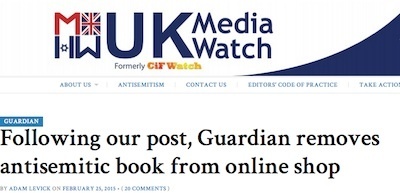
The following post is taken from the Ultra Zionist CIF Watch. The hawkish Israeli outlet is bragging today about its success in persuading The Guardian to remove The Wandering Who from its online book shop. Needless to say that The Wandering Who was published three years ago, it has been a best seller since then. It was translated into 12 languages and not a single claim referring to any form of hatred has been issued in the UK or anywhere else. The Wandering Who has been endorsed by the most impressive list of scholars and humanists. Seemingly, it doesn't take much for The Guardian to shamelessly surrender to pressure made by supporters of ethnic cleansing Israel.
To buy The Wandering Who on Amazon.co.uk
To issue a complaint to the Guardian Reader's editor: Email: reader@theguardian.com
• Phone: +44 (0)20 3353 4736 between 10am and 1pm UK time
• Twitter: @GdnReadersEd
By Adam Levick
Yesterday, we posted about the sudden reappearance of a book by Gilad Atzmon at the Guardian’s online bookshop which they had removed back in 2011 (due to its extreme antisemitic content) following communication with this blog.

After emailing Guardian editors yesterday to ask about the reappearance of Atzmon’s book, we were informed that their online shop uses automated feeds, and that the removal of specific titles has to be done manually.
So, they again removed Atzmon’s book from their virtual shelves.
Here’s what you see when you open the link to the book.
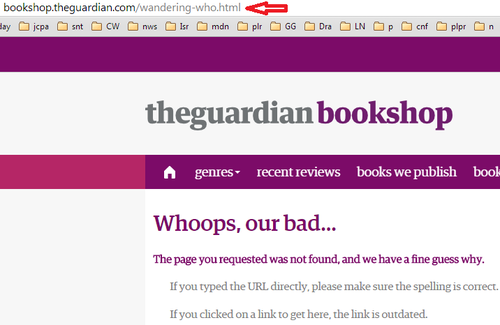
We commend Guardian editors for the prompt removal.
February 24, 2015
Something Else Album Review
http://somethingelsereviews.com/
Gilad Atzmon and his Orient House Ensemble have been busy in their musical kitchen, cooking up a delightful menu for their listeners. Whether you like a la carte, picking and choosing tracks to suit your current mood, or to take a listen right through on the set menu, the result is a tasteful delight. Released on Gilad Atzmon’s Fanfare Records, The Whistle Blower was recorded at the Fish Factory studio in London.
The Whistle Blower is packed with different tastes, styles and moods. The opening track “Gaza Mon Amour” starts with a thumping Eastern beat and melody which transforms into a moody middle section with Gilad Atzmon’s always-dextrous sax conjuring up the feeling of a bazaar with all its mysteries and depths. The piano of Frank Harrison then introduces a classical topping, and the piece returns finally to the Eastern-inspired theme again. “Forever” is a sweet, gentle melody, the beautiful theme set by the sax before the piano takes it and develops it, then returns at the last to the original melody.
“The Romantic Church” takes you on a fantastical journey through majestic sax lines, backed by gentle percussion and bass lines with the piano once again soaring in the middle section. The piece is lifted by emotive playing from Gilad Atzmon, as he sweeps in and out on sax. “Let Us Pray” starts with a sax and drums entry, then a pause before first percussion, then the sax again repeats the theme before the piece develops — scaling up and up, soaring and taking the listener with the musicians as all follow the sax leads. “The Song” is short but very sweet with accordion, drums and piano creating a sense of a boulevard feel. The bass of Yaron Stavi soloes in the middle section and introduces a darker, softer element before the swinging, gentle swaying theme is allowed to re-emerge.
“To Be Free” starts quietly, with a heartfelt sax rendering, before the keys develop the theme and the track revolves around this. “For Moana” — a reference to Moana Pozzi, an Italian porn actress — is a quiet, free-rolling number made by the interaction of sax and piano. The Whistle Blower concludes with its track, and it’s lighthearted with some great vocals from Tali Atzmon and Antonio Feola. The song swings from a sexy introduction with wolf whistles and lazy, laid back singing from the band, an accordion, a bit of unison singing, a bit of background whistling, and a dollop of bawdiness.
The ballady feel to the tracks is reminiscent in parts to the group’s previous album, 2013’s Songs of the Metropolis, but the master chefs have added more ingredients and developed their menu. Listening to the album is like unwrapping a box of chocolates. Many have a familiar feel and texture but the hearts are surprising — sometimes what you expect, but more often not. Each listen reveals another layer, another ingredient which the chefs have added to create the final dish.
The listener is taken to dizzy heights at times before being dropped unceremoniously into the depths of dark rhythms and then lifted once more with a laugh and caressed with the magic of Gilad Atzmon’s saxophone playing. There is a certain rhythm and camber which runs through a lot of Atzmon’s music which could make it predictable but he is also blessed to be surrounded by the gifted playing of Yaron Stavi on double and electric bass, Frank Harrison on piano and keys, and Chris Higginbottom on drums which make sure there is an element of change, excitement and new ingredients added to the chef’s standard dishes.
The Whistle Blower is beautiful in many ways. It leaves the listener with melodies to savor. It is balanced, well delivered and the varied menu is sure to cater for many tastes. On the album sleeve, Gilad Atzmon states that the compositions are about love, nostalgia, devotion and simplicity — and that he hopes the listener enjoys listening to is as much as the band enjoyed making it. I think it is safe to say that has been achieved.
To Buy The Whistle Blower online:
February 23, 2015
In The Name Of Mammon – Jack Straw and Sir Malcolm Rifkind
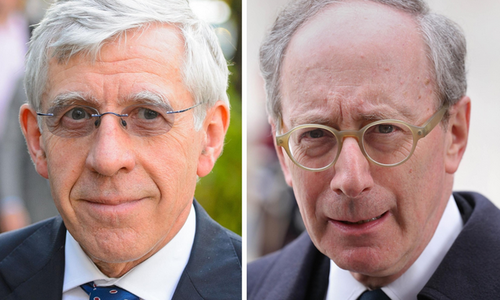
In the last few weeks we have witnessed British Jewish leaders relentlessly complaining about ‘the rise of anti-Semitism.’ This morning we learned that two former foreign ministers are at the centre of a huge 'cash for access' scandal. I guess that Sir Malcom Rifkind is not going to help in the current struggle to defy anti-Semitism. Apparently the Jewish Chronicle is not convinced that Jack Straw passes the ‘Kosher’ test.
The Daily Mail reports today:
Former foreign secretaries Jack Straw and Sir Malcolm Rifkind today sought to defend themselves after becoming embroiled in a new 'cash for access' scandal where they both boasted about charging at least £5,000-a-day.
The pair were secretly filmed discussing how they could use their contacts to benefit a private company for large sums of money.
Sir Malcolm, who is chairman of the highly-influential Intelligence and Security Select Committee, said that he could see any foreign ambassador in London and has 'useful access' to every British ambassador in the world because of his profile.
This morning he claimed he acted 'entirely properly' and it was 'quite unrealistic' to expect backbench MPs with professional backgrounds to 'simply accept a salary of £60,000' without accepting second jobs, and would fight claims of wrongdoing 'with all my strength'.
Mr Straw, one of Labour's most senior figures, claimed he was 'mortified' after footage emerged of him inviting two undercover reporters to a meeting in his Parliamentary office where he claimed to work 'under the radar' for private companies.



